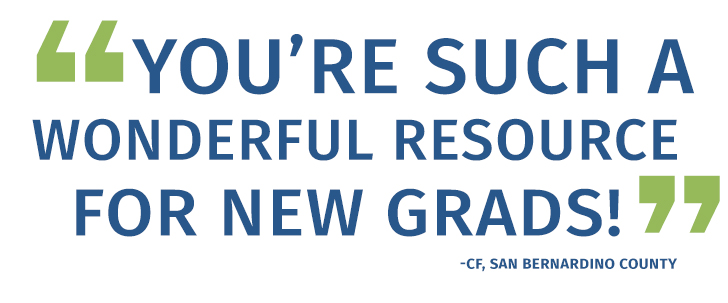30 YEARS OF ADVICE FROM SLPs & CF-SLPs
- Proofread! Keep it error-free. Double check your program completion dates, degrees, and credentials earned. If you have previous degrees, such as an SLPA or an alternate degree outside the field, be sure to include them.
- Effectively outline your baseline skills. Show your potential employer how your background can benefit their school/organization.
- One resume does not apply to all settings. What percentage of your resume addresses the needs of schools? Count by inches of space. If you are still deciding between settings, write one resume for private practice, one resume for rehab/hospitals, and one resume for schools.
- Do not worry about the length of your resume; focus on the quality of the information you provide. 1 to 2 pages is the general standard, PCSS prefers 2-page resumes due to the increase in specific information.
- Visualize the employer’s needs. Consider reviewing their website and social media for clues about current emphases. Review their resources. Do they have STEM schools? High bilingual populations? What do they need to know about your experience?
- Include: the type of students you served in your school practicum, AAC/AT and autism experience, experience attending or formulating IEPs, and formal/informal training (e.g. SEIS, MediCal billing, social skills trainings, Floortime).
- When considering personal information, think from an interviewer’s perspective. What benefits the setting? For example, one of our SLPAs is an artist, and skilled with computers. While neither is directly related to speech, both are huge advantages to his busy supervisors. A CF-SLP is a multi-talented musician: wonderful for enriching the curriculum.
*Prior to the interview, gather contact information for your previous supervisors and facilities. Local interviewers are quite likely to know your supervisors personally: speech-language pathology is a small world.
Be prepared to discuss your graduate program, school-based caseload, evaluation and tools in more depth than can be presented in a resume format.
- If possible, ask who will be conducting the interview. Be prepared to interview with multiple staff members at the same time, or sequentially. A teacher/principal panel is likely to focus on curricular and interactional questions, whereas a SLP will ask more specific questions regarding your background.
- Do a thorough internet search and web review to get a sense of the culture of a school or practice prior to your interview. Ask professors or last year’s class whether anyone has interviewed/worked with the employer. Check reviews on Glassdoor, Google, and Indeed. Look for patterns in the comments. Come up with 1 or 2 thoughtful questions about the facility.
- In addition to extra copies of your resume and recommendations, consider bringing additional material that you have ready on request. Suggestions: a list of tests that you have mastered, a sample de-identified evaluation report, a “memory trigger” list of favorite materials for social skills learning, or an especially creative lesson method/plan.
- Many people become anxious in interviews. Their speech speeds up, and they “babble.” Don’t be afraid to be silent or ask for clarification: it demonstrates how you will react when faced with tense job situations. When in doubt, PAUSE!
- “What are your weaknesses/growth areas?” The interviewer is interested in how you evaluate your clinical and personal skills. Prepare for this question, it is common. Example of an excellent answer: “The combination of my graduate courses and internships provide me with well-balanced preparation for this position. However, if I were choosing the area where I might need the most support, it would be (example) fluency, as my fluency cases were limited during my practicums. That said, thanks to my professors and mentors, I can effectively research areas based on client need through the ASHA portal and other sources. I have also been given high marks for my willingness to use other mentors and peers as resources to build my knowledge. If you have any specific resources for this area, I would love to review them.” Excellent response; it shows the candidate is resourceful and on the road to self-supervision.
- Use your intuition, research, and smart questions to determine the “soft skills” your interviewer needs for the position. For example, at Pacific Coast Speech Services, we look for clinicians who are kind, calm, able to blend into a school environment without ruffling feathers, organized, and not afraid to say, “Let me check with my supervisor.” We’ve had interviewees who determined these values based on our website, as well as interviewees who asked us directly. In both cases, they were able to highlight their own strengths more effectively.
- Ask questions that get the interviewer talking spontaneously. For example, “How long have you worked here?” or, “What do you like about it?” or, “Tell me about your CFs from last year, are they still with you? What did they struggle with the most?” Listen for what they do and don’t say.
- Check our CF Tips Sheet for some suggestions on judging the quality of supervision. Remember that an interview is a two-way, information gathering session. Consider reviewing the questions on the Tips Sheet before and after the interview to solidify your impressions. Open-ended questions are recommended, for example, “What can I expect in my first month of working in the district and the beginning of my supervision?”
- Consider a phone conversation a formal interview. It is best to schedule them, but you may get a call from an interviewer at a time you don’t expect. Feel free to say, “I would love to speak with you. May I call you in 5 minutes?” Use that time to pull off the road or to do whatever you have to do to get interruption-free time.
- If it is not a good time for you to focus and be interviewed, say that up front and set up a time to talk further. It is permissible to say, “I would love to speak with you, but I am in my car” or, “I am heading into class. Can we talk briefly and then set another time?”
- When you make a call to a job site, have your resume in front of you in case the interviewer answers. If you make a call expecting to get voice mail and instead the interviewer answers, say, “I just wanted to return your call and set up a time to talk.”
The majority of school districts place speech pathologists based on enrollment figures from previous years, seniority, and preferences of current employees. When a district is interviewing, they typically are choosing someone for an anticipated vacancy. This can change due to staff availability, requests for transfer, and enrollment changes. Although they may describe a specific position in the district, it is not unusual for needs to change especially over the summer. Generally, a district contract is for a full school year, and is to serve the district not a specific school.
- Read the signs. Pay attention to who is interviewing you, the specificity of the questions asked, and the time taken to determine your skills. This will be an initial clue as to how carefully positions will be vetted for workability, and how carefully the match is made. Example: phone screenings are completed by our Director of Staffing, Louise Valente, who is also an SLP. She focuses on determining whether PCSS is a good fit for your interests and preferences, and you decide together when to schedule a formal interview. Formal interviews are also completed by at least one speech pathologist and often your potential supervisor.
- How are positions chosen? Our SLP founder/directors choose positions based on the specifics of the job and our prior knowledge. We place a high priority on the match as your satisfaction and the satisfaction of our long-time district partners is critically important.
- Pay attention to how supervisors are assigned within contract companies and whether there are additional supports available. Use the CF Tips and the interview section above as a model for questions you can ask to evaluate the quality of this most crucial piece of your experience.
- PCSS never asks a district SLP to supervise one of our speech pathologists. District SLPs are helpful and often supplement our support by training you on the ins and outs of their specific procedures, but we take full responsibility for your supervision without charging the district. If a contract company depends on a district SLP to provide supervision, it may lead to a substandard experience.
- Most importantly, make sure that you have as much information as possible. Supervision and contract “workability” should be your absolute key criteria. A longer drive, or other compromises will fade in comparison to the importance of regular hands-on targeted support vs. “trial by fire.”
- One common mistake of clinical fellows is assuming that direct hires receive better supervision, or contractors receive better supervision. You should have enough detailed information by this point to make a careful decision on the specific employer. Consider talking out the pros and cons with a trusted SLP advisor.
- Make sure that you are clear on the offer, both financially and in terms of supervision. In the case of a direct district hire, be sure that you have verification of the supervision plan in writing from both HR and another clinical source such as the Special Education Coordinator or Director of Special Education. Be prepared to discuss the requirements of supervision.
- Ask if you can speak to the current/most recent CF regarding their experiences. Often, employers will not allow this until after they have extended a job offer. Verify what you have been told about supervision. Be sure to ask if the CF plans to continue with the company or site when their RPE/CF is complete and listen for their level of enthusiasm.
- If possible, ask to speak with your potential supervisor to be sure you have a good fit. Ask, “What responsibilities are you giving up to work with me? Will your caseload be adjusted? Can you observe me with a student when needed or do you live too far away?”
- “How many hours of supervision will I receive? Will it vary during the year? Will the hours be given on or off site?”
- Be aware that school district contracts extend until the end of the school year. You will be expected to complete the contract unless there are very unusual circumstances such as a spouse’s work relocation.
In addition to the factors above:
- Be aware that agencies have widely varying policies on when contracts are offered and assigned. Some prefer to sign contracts with clinicians, pay a signing bonus and then search for positions. Be sure that you are clear on your obligations to an agency if you sign a contract before a position is offered. What happens if positions aren’t with your desired population or within your geographic comfort zone? Are you allowed to continue applying elsewhere after signing a contract? What happens if the agency does not have an available position in your area by the start of the school year?
- Be honest with all parties. Let contracting agencies know if you are talking to more than one company, if you plan to apply to districts directly, or if you plan to go with the company that offers you the best fit first. A contracting company’s marketing methods may change, or the potential school or district may change their strategy. It is considered bad faith to apply directly to a district when you have been offered a contract position at the same district or vice versa.
- Contract agencies charge districts similar rates for their services. If a company offers you a higher than typical salary and benefits package, it may mean reductions in contact quality, supervision or support. Be aware of this balance.
- Contracts with contracting companies have a variety of release requirements. In most cases, these are more lenient than a direct district hire. Be sure that you are clear and comfortable with these policies. Thirty-day release policies (similar to most general employment positions) can also work in your favor if you find an assignment is not a fit for you. Conversely, be aware that districts can release you before the end of the year. What happens if this occurs? How many districts does that company work with in your area? How many speech pathologists work in your area right now?
- Once you have decided on a setting, ask if you can meet your supervisor prior to the first day of school. Once your supervisor and setting are firm, file your Required Professional Experience (RPE) paperwork as soon as possible. The approval process takes 6-8 weeks. If your supervisor or setting changes, you need to file an addendum to continue your RPE. Here is a more specific flow chart of the pathways to a credential, license, and ASHA certification for California SLPs.
- Begin to gather additional resources on organization and planning. Once you start in your position, your time will be limited. Many great ideas can be gathered from online blogs such as Speech Room News and SLP Now as well as Teachers Pay Teachers and other sources.
- It’s tempting to purchase materials. Request favorites for graduation and holidays, but don’t spend a lot of money until you take inventory of your new site. Thrift Stores can be your best friend! Social media posts requesting books, Legos, and toys that have been outgrown can be very helpful.
- If you are planning to work in a school setting, sign up for our e-newsletter. Our quarterly newsletter provides useful information for busy clinicians in the form of featured articles, tips, and links. No theory, just fast application. It’s free, and has great kid jokes to use in your therapy!
- Our Resources section contains information on a variety of topics that may be helpful to you in whatever setting you choose.
We also offer referral bonuses! If you know of a clinician who is seeking a high-quality contracting agency, send them to us. If they mention your name, you get a referral bonus!
I love doing supervision the PCSS way!
I would not be half the clinician I am today if it weren’t for your support and guidance.
You serve as great role models. I would rate my satisfaction with PCSS at 10!
Thank you again for taking me under your wing and helping me start my life as an SLP.
You are both amazing; with caring hearts, generous hands, and an abundance of insights.






